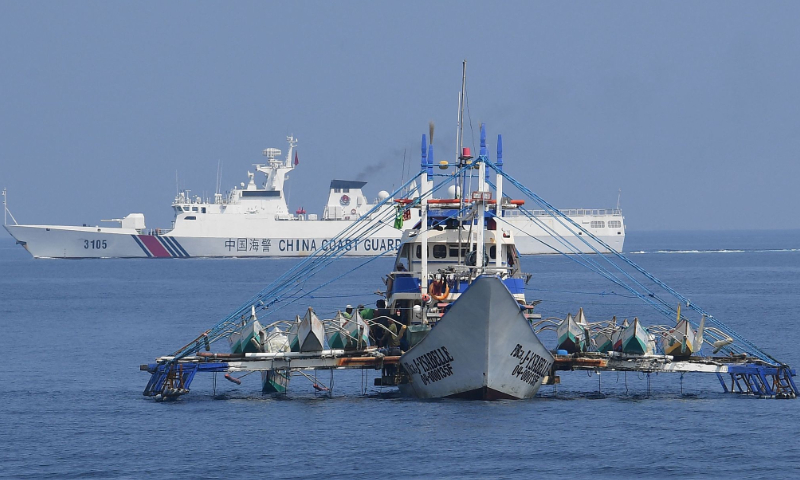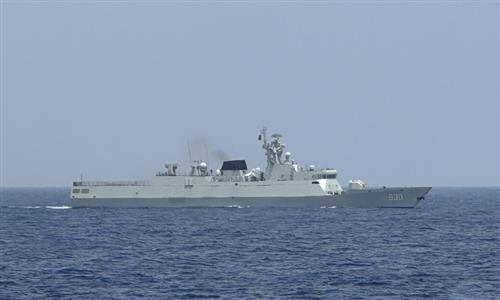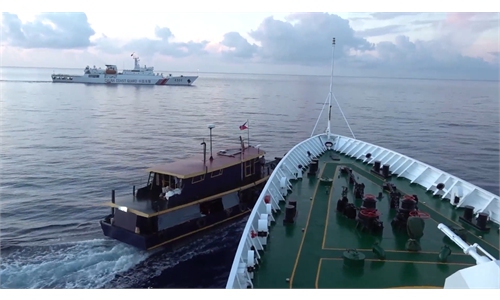China urges Philippines to stop violations of China's territorial sovereignty near Ren’ai Jiao

Chinese coast guard (back) conducts patrol missions in the waters near Huangyan Island in the South China Sea on September 20, 2023. Photo: VCG
China indisputably possesses sovereignty over the Nansha Islands, including Ren'ai Jiao (Ren'ai Reef), and surrounding waters, and China will resolutely safeguard national sovereignty and maritime rights and interests in China's jurisdictional waters, a spokesperson from the China Coast Guard (CCG) said on Thursday.
The remarks came after two small Philippine transport ships and three Philippine Coast Guard ships illegally entered waters adjacent to the Ren'ai Jiao in China's Nansha Islands on Friday without China's permission.
Gan Yu, a CCG spokesperson, said in a statement on Friday that the CCG lawfully monitored the Philippine vessels and implemented control measures, making special temporary arrangements for the transportation of necessary supplies such as food by the Philippine side.
Gan noted that China indisputably possesses sovereignty over the Nansha Islands, including Ren'ai Jiao, and its surrounding waters. The actions of the Philippine side violated China's territorial sovereignty, contravened the Declaration on the Conduct of Parties in the South China Sea, and contradicted its own commitments.
"We urge the Philippine side to immediately cease its infringing actions. The CCG will continue to carry out law enforcement activities to safeguard national sovereignty and maritime rights and interests in China's jurisdictional waters," the spokesperson said.
The Chinese Foreign Ministry also criticized the Philippines' serious violation of China's sovereignty on Friday afternoon, with spokesperson Wang Wenbin saying it has lodged solemn representations with the Philippine embassy in China.
"China urges the Philippine side to immediately stop provocation at sea… China will continue to take necessary measures in accordance with the law to firmly safeguard China's territorial sovereignty and maritime rights and interests." Wang said.
The frequency of maritime disputes between the two countries has been on the rise recently. On October 22, a Chinese Foreign Ministry spokesperson urged the Philippines to stop stirring up trouble and making provocations after two civil vessels and two coast guard vessels of the Philippines intruded the waters of Ren'ai Jiao without China's permission and bumped dangerously with the CCG ships and Chinese fishing vessels. On October 30, The Chinese People's Liberation Army (PLA) blocked a Philippine warship that trespassed into waters off China's Huangyan Island.
Some analysts believed that the US and Japan are important factors behind Manila's increasingly provocative posture.
The Philippines wants more aid from Japan and the US through provoking disputes with China … Manila also aims at asserting the Philippine's improper claims on China's Huangyan Island and the Ren'ai Jiao by leveraging allies' influence, Li Haidong, a professor at the China Foreign Affairs University, told the Global Times on Friday.
On the other hand, the US and Japan are actually using the Philippines to create tension and an unfriendly regional atmosphere toward China, so as to kidnap regional countries as pawns of Washington's strategic competition with China, Li added.
In April, the Philippines and the US named four additional bases that US forces will have access as the pair expand military cooperation, with one site near the disputed South China Sea area and another not far from Taiwan island. The two countries held largest ever drills, which included a live-fire exercise in the South China Sea. In a statement released on October 27, the two countries' defense chiefs reaffirmed that the "Mutual Defense Treaty" extends to both countries' public vessels, aircraft, and armed forces - to include the Coast Guard - anywhere in the Pacific, to include the South China Sea.
During a Manila visit made by Japanese Prime Minister Fumio Kishida last week, the two countries confirmed that they will begin negotiations on a "reciprocal access agreement," to strengthen security ties and facilitate joint defense drills."
"The Philippines wants to make itself into an Asia-Pacific Ukraine, and the US and Japan are doing to the Philippines what Washington did to Kiev, namely fan the flames of conflict," the expert remarked.
As far as the Asia-Pacific is concerned, the hidden danger of the Philippines' continuous provocations against China emboldened by US and Japan is that it will split the regional integration process, leading the construction of economic security into tearing, confrontation, Li said.
"It's only in line with the strategic need of the US and Japan. But for others, it is absolutely a disaster, and can never be supported by the vast majority of countries in the region. Therefore, the Philippines will definitely be left alone," Li said.
Considering the recent detente atmosphere between China and the US and the possible heads-of-state meeting at the upcoming APEC summit, analysts said that despite the US will not give up its strategic competition with China, it is also not looking for a clean break. But what the Philippines is doing is trying to escalate the situation and reach its goal of having the US clash with China to satisfy the Philippines' demands.
The Philippines has overestimated its position in the strategic planning of the US and Japan, as it is neither Ukraine nor Israel, Li said.
Manila's "self-importance" will ultimately do great harm to the Philippines itself and to the region, the expert warned.



